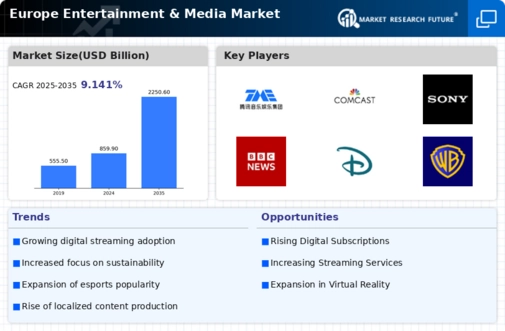Due to a number of important commercial factors, the Europe Entertainment & Media Market is changing quickly. The growing demand for digital information, which is being driven by the proliferation of smart gadgets and the general availability of high-speed internet, is one important factor. European consumers are moving away from traditional media consumption and toward digital formats as they favor on-demand services and streaming platforms. Furthermore, how people engage with and consume entertainment is changing as a result of social media's emergence as a potent instrument for content promotion and dissemination.
Furthermore, technological developments like virtual and augmented reality open us new possibilities for immersive experiences and draw viewers in distinctive ways.
The emergence of specialized sectors, like eSports and podcasts, which have had significant growth in European nations, is one area that warrants investigation. Localized content development, which reflects cultural diversity and accommodates regional preferences, is likewise on the rise in the European market. As consumers increasingly appreciate eco-friendly practices from their favorite businesses and media companies, current trends indicate that the sector is focusing on sustainability. Furthermore, market expansion is supported by the European government's assistance for the creative industries through programs that encourage digital innovation and financing for local content.
All things considered, the European entertainment media market is well-positioned for future growth and innovation due to the convergence of technology, shifting consumer preferences, and supportive legislation.
Europe Entertainment & Media Market Drivers
Increasing Digital Consumption
This trend is further supported by the increase in mobile device usage, where reports suggest that nearly 90% of users in Europe are engaged daily with their smartphones, propelling the digital entertainment sector forward.
Growth in Entertainment Technology
Innovations in entertainment technology, such as augmented reality (AR) and virtual reality (VR), are significant driving forces in the Europe Entertainment & Media Market. A study conducted by the European Union's Horizon 2020 program illustrates that investments in AR and VR technologies are projected to generate over 37 billion euros for the European economy by 2025. Companies like Oculus (owned by Facebook) and Sony are also making strides in this area, launching products that harness these technologies. The increasing adoption of immersive experiences in gaming, education, and marketing underscores a future where entertainment is ever more intertwined with high-tech experiences.
Rising Demand for Local Content
The demand for localized content is an emerging driver in the Europe Entertainment & Media Market. Recent directives from the European Union aimed at fostering a diverse cultural landscape highlight the importance of local language and culturally relevant content in media offerings. For instance, recent regulations stipulate that streaming services must allocate a minimum of 30% of their catalog to European works. This has led to a sharp increase in investment in regional productions by companies such as Amazon Prime Video and Disney+, contributing to job creation in the creative industries and encouraging the growth of local talent.
The rise of these localized offerings not only meets consumer demand but also enhances the cultural richness of the European market.
Europe Entertainment & Media Market
The European entertainment and media landscape is evolving rapidly, driven by technological advancements and shifting consumer preferences, which collectively reshape how content is consumed and monetized.
European Commission














